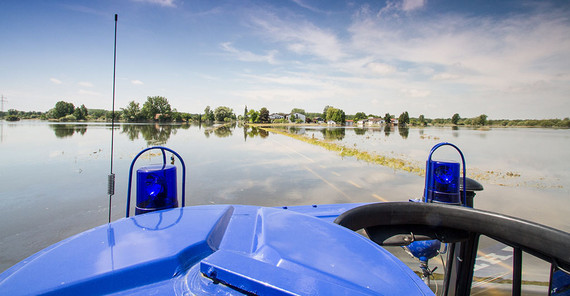“The existing severe weather and flood warning systems in Germany are not sufficient to effectively warn the population of rapid flooding,” says the study’s lead author, Prof. Annegret Thieken. “Future research should focus on how to use these systems to warn vulnerable communities and residents in a timely manner and better communicate the extent of flooding, threats and response options.”
The research team conducted an online survey involving 1,315 people affected by the floods in the summer of 2021. Surprisingly, it showed that 35 percent of respondents from North Rhine-Westphalia and 29 percent of respondents from Rhineland-Palatinate had not received any warning at all. Of those who had been warned, 85 percent had not expected very severe flooding, and 46 percent reported that they had been unsure how to protect themselves from the flood. Whether respondents had previously experienced flood situations played a large role in hazard awareness. The researchers also evaluated media reports and official warnings at the time and found fault with inadequate recommendations for people at risk. “One major problem was that the warnings did not adequately reflect the extent of the flooding, and therefore hazards were underestimated in many places,” says Thieken. “As a result, in some cases the emergency was declared too late and the evacuation of severely affected settlement areas was not initiated soon enough.”
The district of Ahrweiler in Rhineland-Palatinate was hit particularly hard by the flood in July 2021: 134 people died in the floods and there was massive damage. The researchers therefore took a closer look at the information provided by the 357 respondents from this district as part of the Federal Office of Civil Protection and Disaster Assistance project, HoWas2021 (governance and communication in the event of a crisis during the July 2021 flood). The results have been compiled in a German-language fact sheet. “The region-specific fact sheet provides an overview of how respondents from Bad-Neuenahr Ahrweiler, Sinzig and other localities in the district experienced the event and the warning,” says Dr. Anna Heidenreich, a researcher in the HoWas2021 project and co-author of the study. Next month, the research team will also publish profiles based on the online survey for the heavily affected counties in North Rhine-Westphalia.
Publication Link: Thieken, A. H., Bubeck, P., Heidenreich, A., von Keyserlingk, J., Dillenardt, L., and Otto, A.: Performance of the flood warning system in Germany in July 2021 – insights from affected residents, Nat. Hazards Earth Syst. Sci., 23, 973–990, https://doi.org/10.5194/nhess-23-973-2023, 2023.
Contact:
Prof. Dr. Annegret Thieken, Institute of Environmental Science and Geography
Tel.: 0331 977-2984
Email: annegret.thiekenuuni-potsdampde
Dr. Anna Heidenreich, Institute of Environmental Science and Geography
Tel.: 0331 977-2304
Email: annaheidenreichuuni-potsdampde
Media Information 10-03-2023 / No. 027

